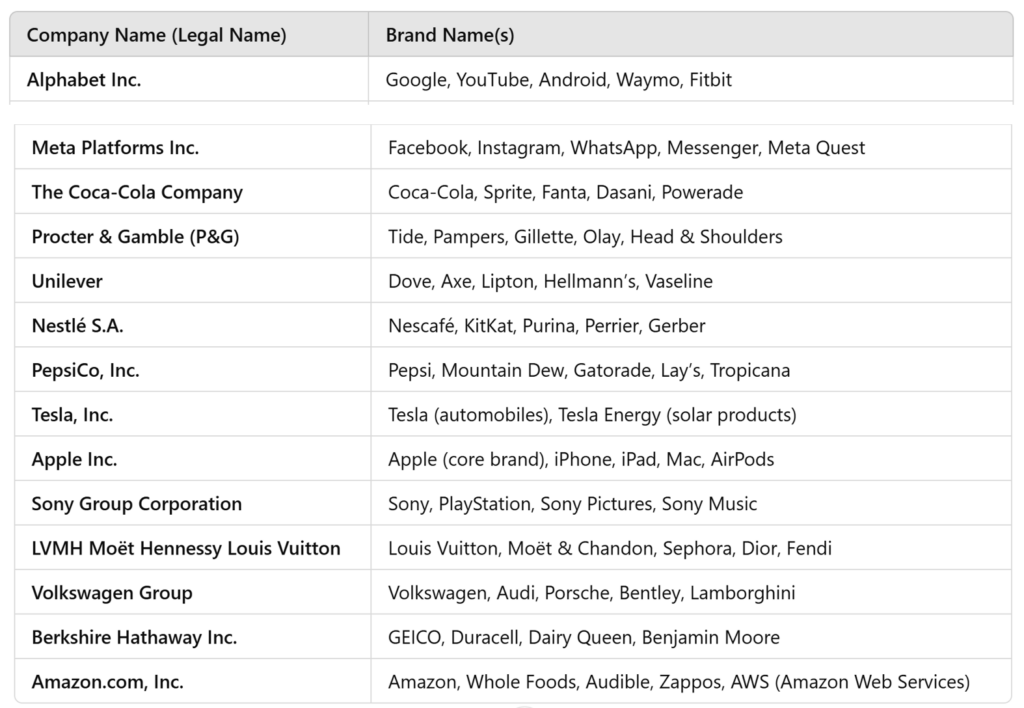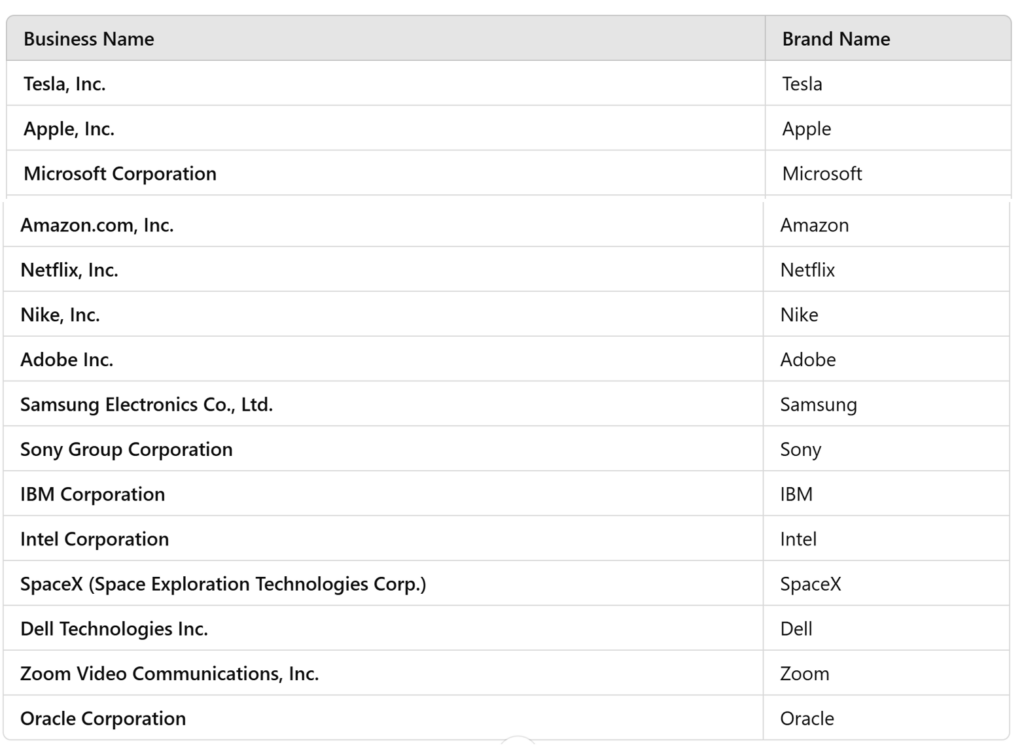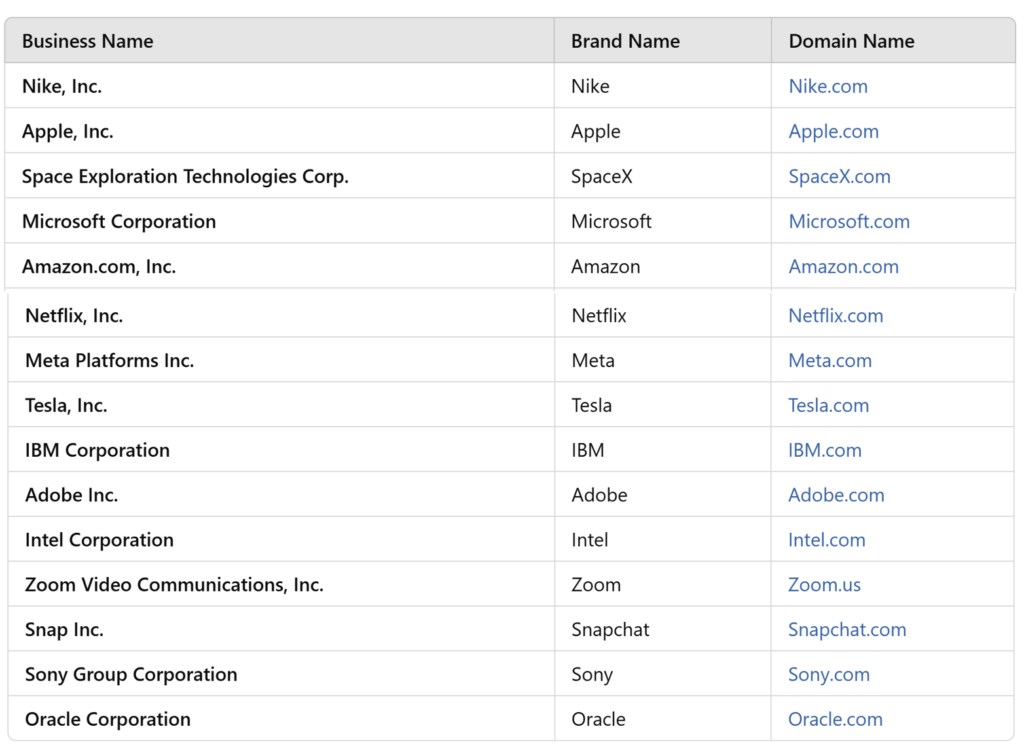The Power of Naming in Business & Online Branding
Choosing the right brand name, business name, and domain name is essential for building a strong, recognizable identity.
While these terms are often used interchangeably, they serve distinct purposes in branding, legal recognition, and online visibility.
- A brand name shapes consumer perception, trust, and recognition.
- A business name is the legal identity of a company.
- A domain name establishes an online presence and serves as a digital address and identity of the business or brand.
Understanding the differences between them helps businesses make a well informed decisions that won’t hurt their brand, but instead – strengthen both their offline and online brand identity.
What is a Brand Name? (The Identity That Customers Recognize)
A brand name is more than just a word—it is the unique identity of a product, service, or company that distinguishes it from competitors in the marketplace. It serves as a recognizable symbol of a business’s values, personality, and reputation, shaping how customers perceive and connect with the brand.
A well-crafted brand name does not exist in isolation; it carries the essence of a company’s mission, vision, and promises to consumers. It influences emotional and psychological connections, helping customers build trust and loyalty over time.
A strong brand name can evoke feelings of reliability, innovation, luxury, affordability, or exclusivity, depending on its positioning in the market.
Beyond marketing appeal, a brand name plays a strategic role in business growth. It affects customer recall, word-of-mouth referrals, SEO performance, and legal trademark protection.
The right brand name can make a company memorable and marketable, while a poorly chosen name can hinder brand recognition and expansion.
A successful brand name should be:
Unique – Differentiates the brand from competitors and prevents confusion.
Memorable – Easy to recognize, recall, and pronounce.
Relevant – Aligns with the brand’s identity, industry, and values.
Scalable – Adaptable to new markets, products, or global expansion.
Legally Protectable – Can be trademarked to prevent infringement and maintain exclusivity.
Many companies operate under a legal business name while owning and managing multiple brands. Below are real-world examples of companies that use separate brand names from their official business names:
Examples of Different Brand Names vs. Business Names

What is a Business Name? (The Legal Identity of a Company)
A business name is the officially registered legal entity name under which a company operates. It is the name recognized by government authorities, tax agencies, and regulatory bodies when a business is formed and conducts transactions.
Unlike a brand name, which is focused on marketing and consumer recognition, a business name primarily serves legal, financial, and administrative purposes.
A business name is used in:
Contracts and Agreements – Legally binding documents, such as vendor contracts, partnership agreements, and employment contracts, all refer to the official business name.
Tax Filings and Compliance – The government recognizes a company through its business name for tax identification, filings, and financial reporting.
Banking and Financial Transactions – Opening business bank accounts, applying for loans, or issuing invoices requires the registered business name.
Intellectual Property Protection – Trademark registrations and copyright claims are often filed under the legal business name.
Business Name vs. Brand Name: Understanding the Difference
A business name is the official name under which a company is legally registered, while a brand name is the identity the company uses to market its products or services.
Some corporations often use different brand names for marketing while operating under a separate legal entity. ( Please see the previous example above. )
But others used brand names that are the same with their business name.
Examples of Brand Names that are the same with Business Names

Types of Business Names
Depending on how a company is legally structured, a business name can take different forms:
Sole Proprietorship Name – Often uses the owner’s personal name (e.g., John Smith Consulting).
LLC (Limited Liability Company) or Corporation Name – Requires official registration and compliance (e.g., Tesla, Inc.).
Trade Name (DBA – Doing Business As) – A name different from the official business registration that is used for branding purposes (e.g., Starbucks Corporation operates as Starbucks).
Why Choosing the Right Business Name Matters
- Legal Compliance – A business name must be legally available, properly registered, and compliant with local regulations.
- Credibility & Professionalism – Using a properly registered name enhances trust in business dealings.
- Expansion & Trademark Protection – A strong legal name allows businesses to protect intellectual property and expand into new markets.
What is a Domain Name? (Your Digital Identity)
A domain name is the unique online address of a brand, business, or individual.
It serves as the digital gateway that allows customers, clients, and stakeholders to access a company’s website, emails, and online resources.
Much like a physical address guides people to a storefront, a domain name directs users to a business’s online presence, making it an essential component of modern branding and digital marketing.
Without a domain name, businesses would be forced to rely on long and difficult-to-remember IP addresses (e.g., 192.168.1.1) to direct users to their website. Instead, domain names offer a human-friendly way for customers to find and interact with brands online.
Why a Domain Name Matters in Business & Branding
A domain name is more than just a website URL—it plays a critical role in establishing trust, authority, credibility, and brand consistency.
Digital Identity & Brand Recognition – A well-chosen domain reinforces a brand’s identity and makes it easier for customers to find and remember.
Professionalism & Credibility – A custom domain (yourbusiness.com) looks far more professional than using a free subdomain (e.g., yourbusiness.wordpress.com).
Marketing & SEO Benefits – Search engines (like Google) consider domain relevance when ranking websites, meaning a keyword-rich or well-branded domain can improve online visibility.
Ownership & Control – Owning a domain ensures full control over your digital presence, unlike social media profiles that operate under third-party platforms.
Email Branding – A domain allows businesses to use custom email addresses (e.g., [email protected]) instead of generic services like Gmail or Yahoo, reinforcing brand legitimacy.
How Brand Name, Business Name & Domain Name Connect

Best Practices for Choosing the Right Domain Name for Your Brand
Selecting the right domain name is crucial for long-term business growth and brand positioning. Here are key best practices when choosing a domain:
Keep it Short & Memorable – Easy-to-spell, recognizable names perform better (e.g., Tesla.com).
Secure the Exact Match (If Available): Your brand name should ideally match your domain (Tesla → Tesla.com).
Use a .COM When Possible – While new TLDs exist (.ai, .tech, .store), .COM remains the most trusted and widely used.
Consider Alternatives if .COM is Unavailable: Use .AI, .Tech, .Co, .IO, or brandable alternatives.
Avoid Hyphens & Numbers – They make domains harder to type and remember (e.g., My-Business-123.com is less user-friendly than MyBusiness.com).
Check for Trademarks & Legal Conflicts – Ensure the name isn’t trademarked to avoid legal issues.
Think Long-Term – Choose a domain that allows for future expansion beyond current products or services.
Domain Names: A Business Asset That Grows in Value
A domain name is not just an online address—it’s a digital asset. Premium domains have been sold for millions, proving their investment potential.
Example of premium domains sold:
Cars.com – Sold for $872 million
Voice.com – Sold for $30 million
360.com – Sold for $17 million
NFTs.com – Sold for $15 million
A strong, strategic domain name can become a valuable business asset, making it a worthwhile investment for long-term success.
A well-chosen domain name unifies branding, trust, and online visibility, making it a critical business asset.
Understand the Relationship Between Brand, Business & Domain Names as:
A brand name builds recognition & emotional connection with customers.
A business name is the legal entity for operational and financial purposes.
A domain name provides a digital presence, making the brand accessible online.
What’s Next?
Read Next: How a Strategic Domain Portfolio Protects & Grows Your Brand













